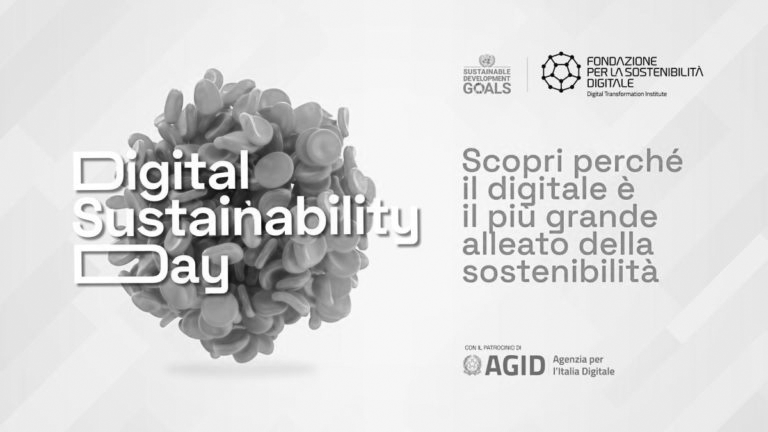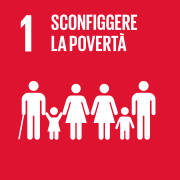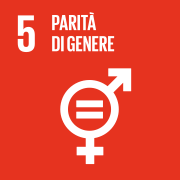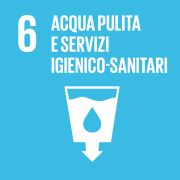
On 18 April, during the week ofEarth Day, the Digital Sustainability Day took place: the main meeting in Italy – hosted by theSapienza University in Rome – dedicated to the topic of digital sustainability, as well as an annual conference at which the Foundation for Digital Sustainability, on its ‘birthday’, recounts the results of the projects and initiatives implemented during the year, and announces those planned for the immediate future.
The event, hosted by Anna Migliorati, was opened this year by the account of the Foundation’s first three years by Luciano Guglielmi, Director of the Steering Committee, and Simone Pastorelli, Director of Communications, and by the institutional greetings of the Hon. Adolfo Urso, Minister of Enterprise and Made in Italy: ‘Knowing the technologies to understand their potential is the key element for digital sustainability. This is why the discussion on digital sustainability, carried out by the Foundation for Digital Sustainability, is very important for companies that can play a significant role in promoting a change that produces positive effects‘.
In the morning, space was also given to the political point of view on Digital Sustainability issues, with speeches in the dedicated round table by Paola Salomoni (Councillor Emilia-Romagna Region), Lorenzo Basso (Democratic Party), Giulio Centemero (LEGA), Federico Mollicone (Fratelli d’Italia), Adriano Paroli (Senator Forza Italia), Mauro Del Barba (Italia Viva and President Assobenefit), Ignazio Zullo (Fratelli d’Italia).
DiSI 2024: the Italian gap between large and small centres
Once again this year, the event was an opportunity to present the results of the latest research by the Foundation’s Observatory for Digital Sustainability, carried out in collaboration with theSan Pio V Institute of Political Studies and based on the DiSI (Digital Sustainability Index), devised by the Foundation. “The peculiarity of this year’s survey is that we compared the large cities in each region with the smaller municipalities,” commented Stefano Epifani, President of the Foundation for Digital Sustainability, “Our goal was to analyse the change in the way Italians living in large cities experience digital technologies and the concept of sustainability compared to those living in the smaller municipalities: those with less than 3,000 inhabitants. The result is that with respect to these issues we are faced with two Italies, but not that of the north and that of the south, but that of the large municipalities and that of the small municipalities‘.
The results of the research – commented on at the round table with Paolo De Nardis (Istituto di Studi Politici San Pio V), Michele Fioroni (Councillor for Economic Development, Digital and Innovation of the Umbria Region) and Roberto Natale (RAI) – show, for example, that as many as 34% of the inhabitants of large cities have little or no knowledge of the concept of sustainability: one Italian in three. But this percentage rises by almost 20 percentage points, to 53%, if we consider municipalities with fewer than 3,000 inhabitants. In other words, one in two Italians living in small towns (and, let us remember, 80% of Italian municipalities are under 3000 inhabitants) do not know what sustainability is. This is a difficult gap to bridge if we take into consideration the objectives contained in the National Strategy for Sustainable Development of Benessere Italia, the body of the Presidency of the Council whose task it is to coordinate, monitor, measure and improve the policies of all Ministries in the name of citizens’ wellbeing.
“With this strategic partnership with the Foundation for Digital Sustainability, the San Pio V Institute of Political Studies focuses on the strategic role of twin transitions with respect to contemporary social and economic evolution. Together we are studying the perception patterns of Italians on the issues of sustainability and digital technology in order to trace the evolution of a phenomenon on which the competitiveness of the country depends: the focus on the difference between metropolitan cities and inland areas that we have given this year’s study provides particularly useful readings for the institutions in understanding how to build a relationship with citizens and develop cohesion policies,’ explained Paolo De Nardis, President of the San Pio V Institute of Political Studies.
In fact, it is clear that the need to raise awareness on this issue remains a great challenge for both larger and smaller urban areas, but also a major issue for institutions in the elaboration of new territorial policies, in the implementation of new models of development and territorial governance.
Another worrying fact that emerges from the research is a great difficulty on the part of Italian citizens in viewing digital technology as a tool at the service of sustainability, be it environmental, economic or social. “We are all called upon to reflect on the degree of awareness we have and on how important it is to practise sustainability even in the digital world,” saidHon. Anna Ascani, Vice-President of the Chamber of Deputies, “often, and the Foundation has shown this with its research, citizens are not fully aware of what impact technologies have on their lives and what digital sustainability means. The Foundation’s very important work is to help shine a spotlight on this issue and to stimulate awareness‘.
And, again, this difficulty is inversely proportional to the size of the area of residence. “This leads to the paradox that those services that should and could be more useful precisely to the inhabitants of the smallest municipalities are less known and less used by this very segment of the population: the most striking cases are those of digital public administration and healthcare,” Stefano Epifani further pointed out.
UNI PdR 147/2023: Organisations at the test of Digital Sustainability
Later in the day, ample space was given to UNI PdR 147/2023, the first UNI Reference Practice on Digital Sustainability realised by the Foundation in collaboration with associated realities such as Enel, ACI Informatica, Bludigit-Italgas and Cisco Italia, and with the active support of others such as MM Spa and Fondazione EY. Together with Salvatore Marras – the Foundation’s Public Sector Manager and coordinator of the project – the document was examined in depth in terms of its characteristics and the opportunities its application can offer in the dedicated round table with Domenico Squillace (UNINFO), and Fabrizio Pedranzini (CODAU).
In a context in which it is now crucial for any organisation, public or private, to direct the levers of digital transformation with a view to sustainability, it becomes particularly important to understand what advantages the public administration could gain from embarking on a path towards digital sustainability. A topic, this, discussed by Mario Nobile, Director General of the Digital Italy Agency in his dialogue with the Director General of ACI Informatica Mauro Minenna: ‘Digital sustainability represents a fundamental lever for a public administration that wants to respond to the challenges it faces. This is also why we have made it one of the guiding principles of our three-year plan. In fact, we have initiated a collaboration with the Foundation for Digital Sustainability to bring models, criteria and principles oriented towards the use of digital transformation for sustainable development within the public administration, also by leveraging a fundamental resource such as the RTD network‘.
From the Digital Sustainability Award to future projects
Sustainability and digitalisation are two of the most important drivers of economic and social growth in the coming years, but data from the Foundation’s Observatory show that 3 out of 10 young people still believe that technology is not crucial in the fight against climate change. The development of skills on the subject is therefore of fundamental importance, as Davide D’Amico, Director General for Information Systems and Statistics at the Ministry of Education and Merit, emphasised in his speech, but the challenge is, even before that, a cultural one: this is why the Foundation, together with the EHT Group, has launched the ‘Digital SustainabilityAward’ project, the Thesis Award created to promote the culture of digital sustainability in university students entering the world of work.
After a long roadshow to present the project, which visited several Italian universities in 2023, the Digital Sustainability Day was the venue for the awarding of the three best theses – respectively in the categories best master‘s thesis, best doctoral thesis, and best “ICT women’sthesis” – selected by the jury composed of professors Alberto Marinelli (Sapienza University of Rome), Tiziana Catarci (Sapienza University of Rome), and Lara Lazzeroni (University of Siena). “Engaging and retaining talented young people in our country,” said Emanuele Spampinato, Chairman of the EHT Group, “is crucial for the future of a sector of Italian excellence such as innovation, but not only. With this project that we are pursuing as a partner of the Foundation for Digital Sustainability, the world of business dialogues with that of the university on a topic such as the relationship between technology and sustainability, which are and will be in the coming years the keywords of strategies and business visions with which young people will have to deal“.
The last part of the day was then dedicated to an update on current and future projects, through the words of Laura Guastella, Executive Director of the Foundation, and many members of the Steering Committee. Michele Tessera, CIO of Gruppo CAP, presented the Foundation’s vertical working groups planned for 2024 – Sustainable Water (whose Position Paper has already been recently presented at a dedicated event), Diversity & Inclusion, Sustainable Mobility and Digital Wellbeing – while the next steps of ‘Digital 4 Aid‘, the project that aims to concretely demonstrate how digital can be a tool for sustainability, were recounted by Francesco Castanò, Deputy General Manager of ACI Informatica. With a glance at the future, reference could not fail to be made to the new edition of the Stati Generali della Sostenibilità Digitale (General States of Digital Sustainability ), which, as announced by Marzio Bonelli, CIO of MM Spa, will be held in Bologna in November 2024: the event, which will reach its third edition, will see the birth of several of the initiatives presented during this Digital Sustainability Day, and at which the foundations will be laid for the new projects that will animate the coming months of work of the Foundation and its partners.
















